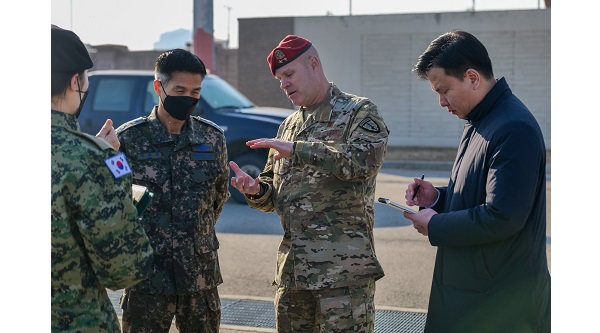
The editor of SOF News had the unique opportunity to interview Maj. Gen. Michael Martin, the commander of Special Operations Command Korea (SOCKOR), during the SOF Week 2023 exhibition in Tampa, Florida. Maj. Gen. Martin provided his insight on the importance of SOCKOR’s mission in Asia and how the command’s interaction with the military forces of the Republic of Korea (ROK) and other allied and partner nations are contributing to the maintenance of peace in that region of Asia.
During the interview the general shared the general aspects of his career. He came from a military family, his dad served in the Air Force. Maj. Gen. Martin started out in the Air Force as an enlisted Airman working in the electronic warfare field. Upon completion of his enlistment, he left the Air Force to attend college. He graduated from Texas A&M University and received his commission into the Air Force in 1992. He began his career as an Air Traffic Control officer and was later accepted into the Combat Control career field.
Maj. Gen. Martin has spent his career in special operations – as well as serving on the air staff, in joint command assignments, and while deployed on numerous combat deployments. Prior to taking command of SOCKOR in June 2021 he was the Director of Operations for Air Force Special Operations Command (AFSOC). His prior assignment was as Deputy Commanding General of NATO Special Operations Component Command – Afghanistan (NSOCC-A) during the 2019 – 2020 timeframe.

Photo: Major General Martin, SOCKOR commander, hosts senior ROK Officers at Osan Air Base in March 2023. (photo courtesy of SOCKOR)
With his tour as commander of SOCKOR soon coming to a close he took some time to reflect on some of the accomplishments and challenges of his past two years. The relationship with the special operations forces of the Republic of Korea is excellent. There are numerous exercises and training events that tie the special operations forces of the United States and Republic of Korea into a tightly knitted SOF community. The U.S. continually sends units and personnel to the Republic of Korea from the SOF units of all the services to participate in exercises.
One challenging aspect of the past few years has been Covid 19. The U.S. Department of Defense issued some very restrictive guidelines that forced units and personnel to adapt how they train and conduct their daily routines. That was one very important aspect of the past two years that required some adaptive measures so that SOCKOR could remain mission ready. South Korea had some very strict measures for the Covid environment; and these policies had to be considered as well.
Another challenging aspect of service in Korea is environmental. The weather in winter months have a limiting effect on military exercises. Training events in a winter environment become difficult – especially in mountainous terrain of South Korea.

One of the balancing acts that a commander must perform is keeping the command 100% mission ready; yet, monitoring the work environment for the command’s personnel – ensuring that they don’t ‘burn out’. Some personnel are on one-year tours and others on longer tours. There is always more work to be done than there is time; so much of the work needs to be prioritized.
The current conflict in Ukraine has provided SOCKOR with some lessons learned that can be implemented into its operations and training. Of note is the use of unmanned aerial vehicles (drones) and the importance of information operations (IO).
SOCKOR is under COCOM of the USSOCOM commander and OPCON of the United States Pacific Command. It is further delegated to U.S. Forces Korea (USFK). SOCKOR is responsible for planning, coordinating, and conducting joint and combined special operations on the Korean peninsula. SOCKOR helps build ROK capacity and capability along three lines of effort:
- Conduct training exercises and events using JCET and JCS exercises
- Employ CA and MISO JCETs with the ROK Ministry of National Defense
- Assist U.S. / ROK interoperability through SF Detachment 39 liaison officers (LNOs)
If hostilities begin with North Korea, elements of SOCKOR and the ROK Army Special Warfare Command, Naval Special Warfare Brigade, and the Air Force Special Operations Squadron will establish the Combined Unconventional Warfare Task Force (CUWTF). The CUWTF would be commanded by a ROK lieutenant general with the SOCKOR commander as his deputy.
Maj. Gen. Martin will soon leave his assignment with SOCKOR. He will next serve as Director of Operations at United States Special Operations Command (USSOCOM). He will be replaced in mid-2023 by Brig. Gen. Derek Lipson, a Special Forces officer in the U.S. Army, who will become the commander of Special Operations Command Korea.
*********
Top map derived from Central Intelligence Agency (CIA). All other images from USSOCOM or SOCKOR.